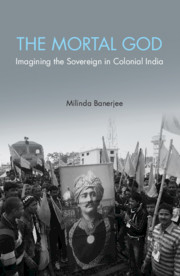Book contents
- Frontmatter
- Dedication
- Contents
- Acknowledgements
- Note on Transliteration
- Abbreviations
- Note on Documents Used
- Introduction
- 1 ‘Caesar of India’: Debating the British Monarchy and Colonial Rulership
- 2 ‘State is the Household Vastly Enlarged’: Imagining Sovereignty through the Princely States
- 3 ‘One Law, One Nation, One Throne’: Debating National Unity
- 4 ‘One has to Rule Oneself’: Collectivising Sovereignty in Peasant Politics
- 5 ‘God's Kingdom Has Come’: Messianic Sovereignty in Late Colonial India
- Conclusions and Further Thoughts
- Index
Introduction
Published online by Cambridge University Press: 13 September 2018
- Frontmatter
- Dedication
- Contents
- Acknowledgements
- Note on Transliteration
- Abbreviations
- Note on Documents Used
- Introduction
- 1 ‘Caesar of India’: Debating the British Monarchy and Colonial Rulership
- 2 ‘State is the Household Vastly Enlarged’: Imagining Sovereignty through the Princely States
- 3 ‘One Law, One Nation, One Throne’: Debating National Unity
- 4 ‘One has to Rule Oneself’: Collectivising Sovereignty in Peasant Politics
- 5 ‘God's Kingdom Has Come’: Messianic Sovereignty in Late Colonial India
- Conclusions and Further Thoughts
- Index
Summary
Introductory Section
While I was finishing this book, a series of dramatic events captured public attention in Indian media. The events centred on the Cooch Behar district of the Indian state of West Bengal: I would argue that they have a spectacular import for any serious appraisal of the modern Indian polity. They certainly illumined many of the central questions studied in this book, about the hierarchical construction, as well as eventual – if fragmented – democratisation, of sovereignty and rulership in nineteenth and twentieth century South Asia.
Located in sub-Himalayan northern Bengal, on the border with Bangladesh and the Indian state of Assam, Cooch Behar is a region which rarely captures much media interest, remote as it is from centres of power in New Delhi or Kolkata. Yet, in February 2016, members of the Greater Cooch Behar movement, led by Bangshi Badan Barman, came to national limelight by stopping the movement of several important trains throughout the region. Their main demand was that Cooch Behar should be granted the status of a separate state or union territory within India, but outside the state of West Bengal. The blockade, in which thousands of local people were involved, continued for days and could be ended only through massive police violence. In colourful photographs splashed across Indian newspapers, these insurgents were seen carrying history-evoking flags and images, including those of the most famous princely ruler of modern Cooch Behar, Nripendra Narayan (r. 1863–1911) [see cover image]. In the name of a past kingship, the agitationists were, in effect, demanding their autonomous political existence.
Some months later, another faction of the Greater Cooch Behar movement, led by Ananta Roy, again captured the attention of national media. The faction was accused of raising a people's militia, named the Narayani Sena (an epithet derived from the old rulers of Cooch Behar, whose names carried the Narayan suffix, after the Hindu god). It was reported that Roy had built a simulacrum of the Cooch Behar princely palace in a village outside Cooch Behar town, where he held a royal court, complete with a throne, armed retinues and courtiers, even as he received regular tribute from his ‘subjects’. In an interview, Roy confessed: ‘I am a king because the people here made me the king. I am a king in exile.’
- Type
- Chapter
- Information
- The Mortal GodImagining the Sovereign in Colonial India, pp. 1 - 50Publisher: Cambridge University PressPrint publication year: 2017



